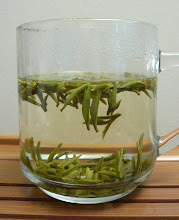The tea leaves are from the earliest harvest of spring. They are very small and don't look as handsome as leaves of many other famous teas.
When brewed in the glass, the leaves expand and look very alive! For an early spring green tea, it has surprisingly rich flavor. I hadn't expected such small leaves would yield so much flavor.
Production of this tea started from 2004. This is the first year I've ever had this tea. It's rarely seen in market, even in China. I always look for new teas to taste. But I know I can't have all of them. Life is so short and there are so many teas to experience. I would have otherwise neglected this tea, but I was lucky to have obtained a small pack of it, along with a few other rare teas, in a group shopping opportunity in China! It's one of the tastiest green teas I've got this year. Still I don't know how this tea can stand out among numerous famous green teas in market. But I believe if the manufacturer remains religious about their tea making and carry forward their eco-friendly cultivation, they have great expectations.
I would like to include it in Concept Tea because it's one of the newest tea varieties with its root deep into history.
Although the idea of this tea is based on a legend in Zen history, it is not just a story. Zen and tea culture have intermingled with each other since both of their earlier stages.
In the 6th century, Bodhidharma brought Zen Buddhism to China. He is regarded as the first Patriarch of Chinese Zen (and he was the 28th Zen Patriarch from India, the source of Buddhism). One of the many legends about origin of tea is, when Bodhidharma had his famous nine-year meditation, chewing leaves falling off a nearby tree helped him drive away sleepiness. The leaves turned out to be tea leaves. This is just a legend, without exact historical records.
According to historical records, in mid 6th century, the successor of Bodhidharma, Hui Ke took shelter in Southwestern Anhui (today's Tai Hu County) to hide away from religious persecution. It was in Southwestern Anhui that Hui Ke carried forward Bodhidharma's Zen practice and developed Zen into a major branch of Chinese Buddhism. Hui Ke's successors, the third and fourth Zen Patriarchs, as well as many famous Zen masters in later generations, all spent significant time of their lives teaching and practicing Zen in the mountains of Southwestern Anhui. This is also a very important region in tea history. The culture of Zen-Tea originated right here, during Hui Ke and Seng Can (the third Zen Patriarch)'s life time.
There are stories among Zen students about Hui Ke invented a way of processing tea for his students. The tea helped the students keep alert during meditation, as well as making them smarter. These are just stories, without specific historical records. However, it's very possible that the stories were from real history, considering Southwestern Anhui is one of the best green tea regions of China throughout history.
The historical records of Hui Ke's successors using tea in their Zen practice to some degree re-enforce the stories of Hui Ke making tea. It's well documented in Zen history that the third Zen Patriarch, Seng Can integrated tea culture in his Zen teaching. And later on, Tea appeared in more and more historical documents of Zen, as well as Zen poems. In his teaching, Seng Can wrote this Zen poem to his student Dao Xin (who later became the fourth Zen Patriarch): 华种虽因地,从地种茶生,若无人下种,华地尽无生。(Before a great tea germinates from the earth, someone has to put the seed in the soil. Even the richest land couldn't possibly give rise to a plant, if the seed was not put in the soil from the beginning.) This is Seng Can's interpretation of Zen. My understanding of it is, we must cultivate to harvest, study to learn, and hold a strong will to reach the enlightenment. It is as simple as some of our daily work, and it can be as hard as making a great tea.

































1 comment:
Very Cool. Would like to try that tea.
Post a Comment